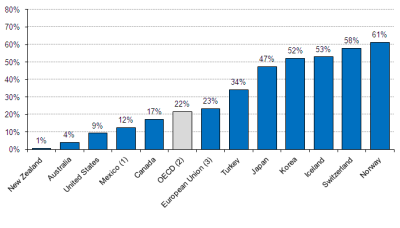The sharpest rises in support to farmers (in relation to total receipts) last year occurred in Canada, where the PSE rose to 20% from 13% of farm receipts, in Korea (52% from 46%), Norway (66% from 60%) and Switzerland (63% from 57%). In each of these countries the main cause was increased price support for dairy products.
Producer Support Estimates as % of gross farm receipts, 2007-09 average

In the US, support to farmers rose to 10% of total farm receipts from 8% last year while in the EU the rise was to 24% from 22%. In Australia, the ending of exceptional payments linked to the restructuring of the dairy industry reduced the overall share of government support to farmers.
Support to farmers in the European Union fell in nominal terms as domestic prices in the region dropped more sharply than world prices last year however, in relative terms it increased slightly to 24% of their total receipts. In Australia, the ending of exceptional payments linked to the restructuring of the dairy industry also reduced the overall share of government support to farmers.
The report argues that with public budgets under pressure in the wake of the economic crisis, governments need to reassess and adapt their farm support policies to meet specific economic, social and environmental objectives.
It says better targeting of support is needed to tackle particular issues such as managing risks or protecting the environment. Policy makers should reduce subsidies which distort markets and cut the link between government payments and agricultural production.
Compensating farmers for low prices or insulating consumers from price fluctuations through export controls merely contributes to higher volatility in world prices, the report says.
Ken Ash, the OECD’s Director of Trade and Agriculture, said: “More focus should be placed on improving risk management while better functioning and more transparent global markets could reduce price volatility.”





